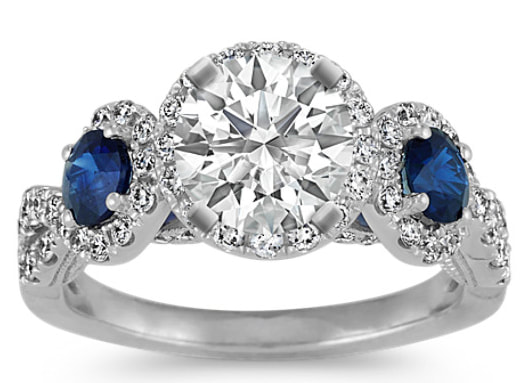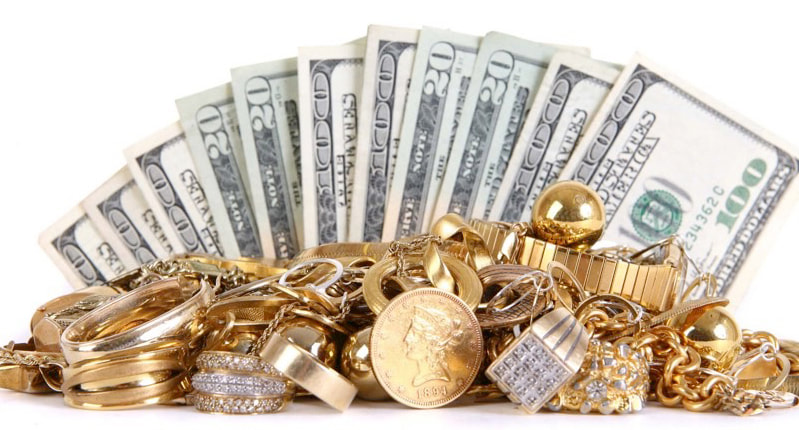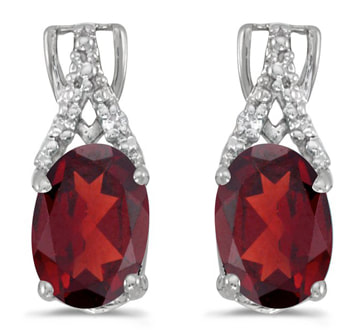Estate Jewelry Value Guide
Section 7 Selling
Section 7 Selling
There are various ways to sell your jewelry, watches
or items each with their own pros and cons.I can tell
you this.... there has been no better time in history
to sell your jewelry, watches or items other than
right now.
AUCTION HOUSES: Auction houses can possibly bring the highest prices, but only for certain types of jewelry. Fine auction houses usually have several jewelry related auctions per year. They typically need to approve the items before they will accept them into the auction. You are responsible for getting the items to the auction site as well as numerous fees which may include: photography fees, appraisal fees, and seller’s premium (up to 35% of sales price), and return postage, wire fees, etc. If you have important items and there happen to be numerous buyers that want that item, there could be a bidding war resulting in a high selling price. This is most relevant for important or very rare items with full provenance (pictures, documentation, signed letters, etc). For example: A hundred year old pocket watch owned by a past president accompanied by a picture of that president looking at the watch and a letter mentioning the same watch and signed by president in 1940’s. Or a diamond engagement ring owned by a famous movie star, with a picture of her wearing the ring and a letter telling her sister about the ring and signed. In these cases the jewelry item will bring many times their cash market value, but they must include conclusive provenance. Since most fine auction companies only hold jewelry auctions once or twice per year, you could be waiting many months before a possible sale. Even if there is a winning bidder, who pays for the item, after the substantial listing and selling fees you are unlikely to get full cash market value.
STORE CONSIGNMENT: Jewelry stores may take your item on consignment. If you know of reputable, fine jewelry store why wouldn’t they? There are some instances where store consignment may be a good choice, but typically it only favors the store. They invest nothing and will mark up your piece considerably and then, “if and when” it sells sometime in the future, then they will pay you. But if the store is robbed, goes out of business or the owner is dishonest you will lose out. In the end “if and when” they sell your item they will still only pay you cash market value. If you are unable to find a buyer for cash market value, this may be a good choice.
ONLINE AUCTIONS / CLASSIFED ADS: Online auctions or a classified ad is also an option to sell your jewelry, coins or precious items. People have had success but mostly when something is uncommon, limited or has more demand than supply. For example if you search “diamond ring” on ebay, today there are 3,408,829 diamond rings listed. So the chance that a buyer would even see your diamond ring listing is quite rare, but certainly possible. If you choose to give it a try at least 5 clear and close up pictures are suggested, more are better. Additionally a scan of the certificate, grading report and/or appraisal will help give buyers confidence in making an offer. Keep in mind that there are ebay selling fees and you must accept payment via paypal. The ebay and paypal fees total at least 10% of the sales price.
PAWN SHOPS: Pawn shops might actually be a good choice for people who want a quick and easy short term loan secured by your jewelry, watches or estate items. Find out their interest rate, it might be quite high. Also keep in mind they will loan you a low percentage of the cash market value, but if you are late making the payment they will keep your pawned item. Even if you want to actually sell the jewelry, watches or estate items they usually pay a small percentage of the cash market value. Pawn shop are typically quick and easy but check their online reviews.
SELLING TO AN ESTATE BUYER: This is typically the best option if you search out a GIA graduate gemologist estate buyer. An “estate buyer” should not be confused with an appraiser or broker. A person or company who only appraises will not purchase, and therefore has limited direct knowledge of cash market value. An estate jewelry broker is about the same as giving a store your items on consignment. You will only receive funds “if and when” the broker is able to sell them.
An estate jewelry buyer who is also a GIA graduate gemologist is typically the single best option for selling due to several reasons. Because they are a gemologist they can competently examine your items and determine the correct cash market value. And if they are also estate buyers, in almost all cases they will issue funds via cash, business check or bank wire on the spot. When working with a qualified estate buyer there is no waiting weeks or months for a possible sale. There are no commissions, no selling fees, no advertising fees, no dealing with random buyers online, no shipping valuables through the mail, etc.
My name is Louis Benowitz G.G. and I am the author of this guide. I would be happy to help you with your jewelry, watches or precious items discussed in this guide. Whether you just have some questions or are ready to sell now, contact me any time. For your security and mine CLICK HERE to contact me if you would like to sell something or just have a question.
AUCTION HOUSES: Auction houses can possibly bring the highest prices, but only for certain types of jewelry. Fine auction houses usually have several jewelry related auctions per year. They typically need to approve the items before they will accept them into the auction. You are responsible for getting the items to the auction site as well as numerous fees which may include: photography fees, appraisal fees, and seller’s premium (up to 35% of sales price), and return postage, wire fees, etc. If you have important items and there happen to be numerous buyers that want that item, there could be a bidding war resulting in a high selling price. This is most relevant for important or very rare items with full provenance (pictures, documentation, signed letters, etc). For example: A hundred year old pocket watch owned by a past president accompanied by a picture of that president looking at the watch and a letter mentioning the same watch and signed by president in 1940’s. Or a diamond engagement ring owned by a famous movie star, with a picture of her wearing the ring and a letter telling her sister about the ring and signed. In these cases the jewelry item will bring many times their cash market value, but they must include conclusive provenance. Since most fine auction companies only hold jewelry auctions once or twice per year, you could be waiting many months before a possible sale. Even if there is a winning bidder, who pays for the item, after the substantial listing and selling fees you are unlikely to get full cash market value.
STORE CONSIGNMENT: Jewelry stores may take your item on consignment. If you know of reputable, fine jewelry store why wouldn’t they? There are some instances where store consignment may be a good choice, but typically it only favors the store. They invest nothing and will mark up your piece considerably and then, “if and when” it sells sometime in the future, then they will pay you. But if the store is robbed, goes out of business or the owner is dishonest you will lose out. In the end “if and when” they sell your item they will still only pay you cash market value. If you are unable to find a buyer for cash market value, this may be a good choice.
ONLINE AUCTIONS / CLASSIFED ADS: Online auctions or a classified ad is also an option to sell your jewelry, coins or precious items. People have had success but mostly when something is uncommon, limited or has more demand than supply. For example if you search “diamond ring” on ebay, today there are 3,408,829 diamond rings listed. So the chance that a buyer would even see your diamond ring listing is quite rare, but certainly possible. If you choose to give it a try at least 5 clear and close up pictures are suggested, more are better. Additionally a scan of the certificate, grading report and/or appraisal will help give buyers confidence in making an offer. Keep in mind that there are ebay selling fees and you must accept payment via paypal. The ebay and paypal fees total at least 10% of the sales price.
PAWN SHOPS: Pawn shops might actually be a good choice for people who want a quick and easy short term loan secured by your jewelry, watches or estate items. Find out their interest rate, it might be quite high. Also keep in mind they will loan you a low percentage of the cash market value, but if you are late making the payment they will keep your pawned item. Even if you want to actually sell the jewelry, watches or estate items they usually pay a small percentage of the cash market value. Pawn shop are typically quick and easy but check their online reviews.
SELLING TO AN ESTATE BUYER: This is typically the best option if you search out a GIA graduate gemologist estate buyer. An “estate buyer” should not be confused with an appraiser or broker. A person or company who only appraises will not purchase, and therefore has limited direct knowledge of cash market value. An estate jewelry broker is about the same as giving a store your items on consignment. You will only receive funds “if and when” the broker is able to sell them.
An estate jewelry buyer who is also a GIA graduate gemologist is typically the single best option for selling due to several reasons. Because they are a gemologist they can competently examine your items and determine the correct cash market value. And if they are also estate buyers, in almost all cases they will issue funds via cash, business check or bank wire on the spot. When working with a qualified estate buyer there is no waiting weeks or months for a possible sale. There are no commissions, no selling fees, no advertising fees, no dealing with random buyers online, no shipping valuables through the mail, etc.
My name is Louis Benowitz G.G. and I am the author of this guide. I would be happy to help you with your jewelry, watches or precious items discussed in this guide. Whether you just have some questions or are ready to sell now, contact me any time. For your security and mine CLICK HERE to contact me if you would like to sell something or just have a question.
Click buttons below for the Estate & Gold Jewelry
Guide sections.
Free consultation.
Free verbal appraisals.
Immediate and confidential payment via bank check, bank wire or certified bank check in most cases.
The best way to contact Lou is to CLICK HERE and tell us about your items for sale, or ask us a question.
Free email consultation. Immediate payment via bank check, bank wire or certified bank check in most cases. >
Are you ready to contact our Large Diamond
Buyer? Simply Click Here to contact us.
I will personally make sure you experience a safe, fair and confidential transaction. Thank you.
Privacy Policy
I will personally make sure you experience a safe, fair and confidential transaction. Thank you.
Privacy Policy
gemwin.com is a buyer of large diamonds of all shapes
and qualities. We are not endorsed nor affiliated
with The G.I.A. (Gemological Institute of
America) CLICK HERE for GIA's website. We are not endorsed nor affiliated with E.G.L.
(European Gemological Lab) CLICK HERE for EGL's website. We are not endorsed nor affiliated with AGS
(American Gem Society) CLICK HERE for the AGS website.
Copyright 2006 - 2023



